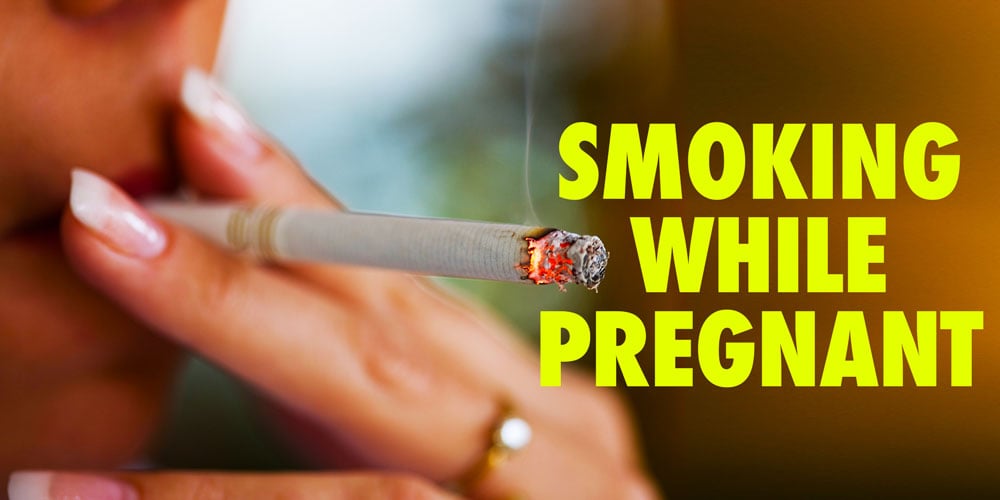
If concern for your own health isn’t enough to make you stop smoking, consider your habit’s toll on your unborn children as well as the potential for negative effects on your grandchildren, and even their children. That’s right – the consequences of smoking while pregnant can filter down for generations.
The effects of smoking while pregnant are exhibited immediately upon a baby’s delivery in the form of low birth weight and decreased respiratory function. Pre-natal exposure to nicotine is also associated with higher rates of birth defects, sudden infant death syndrome, miscarriages and stillbirths. Despite these risks, more than half a million infants are born to mothers who smoke during their pregnancies every single year. Smoking moms are more likely to experience decreased milk production and shorter lactation periods, which can have an impact on the infant’s health as well.
No amount of smoking is considered “safe” during pregnancy.
Cigarettes contain a long list of poisons that travel directly to a fetus’ bloodstream. Because their kidneys and livers have not fully developed the capacity to clear molecules, unborn babies are particularly vulnerable to chemical insults, but the potential for health problems doesn’t end there. Studies about the effects of nicotine on unborn babies are inconclusive, but the evidence seems to suggest that exposure to these toxic chemicals could impact development of critical neural pathways in the brain and result in abnormal development of the central nervous system. They may also affect the levels and functions of vital neurotransmitters like serotonin and dopamine (chemicals in the brain that communicate messages).
And all this can happen before the baby is born.
Even if these challenges are “overcome,” there is still potential for major fallout both physically and neurologically. Nicotine exposure in utero may be connected to an increase in childhood cancers like brain tumors, leukemia and lymphoma. The risk of conduct disorders, attention deficit hyperactivity disorder and juvenile delinquency are likely heightened as well. These conditions may develop into antisocial personality disorder as the child becomes an adult, and can be accompanied by impulsive and sensation-seeking behaviors due to low serotonergic brain activity.
Needless to say, conduct disorders and delinquent behaviors are highly predictive of criminal offenses in adulthood. Even when the analysis is controlled for other factors that may contribute to being a smoker (socio-economic status, maternal age, parental psychiatric hospitalization, etc.) male children of moms who smoked during pregnancy were two times as likely as their non-exposed male counterparts to have a criminal record by the age of twenty-two. Mothers who smoked twenty or more cigarettes a day had the greatest odds of having sons with adult arrest records.
Female babies face the same neurological and physical hurdles as male babies, but exactly how the antisocial behaviors of youth manifest themselves in adulthood is not as clear – probably because they are not as likely to lead to arrest. They may be displayed in the form of increased substance abuse problems or in the destructive practice of social/emotional manipulation.
Both males and females who are subjected to in-vitro tobacco use may be at increased risk for psychiatric hospitalization due to substance abuse problems, but the jury is out on whether the tendency for aberrant behaviors (post-exposure) is directly related to maternal tobacco use. It is more likely a combination of many factors, which include genes, environment and nicotine exposure. Research also suggests that adult children of maternal smokers may experience reduced fertility.
Smoking cigarettes is never safe. A burning cigarette releases a toxic cocktail of over five thousand different chemicals, more than seventy of which may cause cancer. If you are pregnant and still lighting up, think about how your dangerous and unhealthy habit will affect your family for generations to come. Make a New Year’s resolution to stop smoking

Some of the links on this website are affiliate links, and as an Amazon Associate, we may earn an affiliate commission from qualifying purchases – at no cost to you.
This website is for informational and/or entertainment purposes only and is not a substitute for medical advice, diagnosis, or treatment.
© 2025 Drew Pinsky Inc. | All Rights Reserved
Get alerts from Dr. Drew about important guests, upcoming events, and when to call in to the show.
For text alerts, msg and data rates may apply